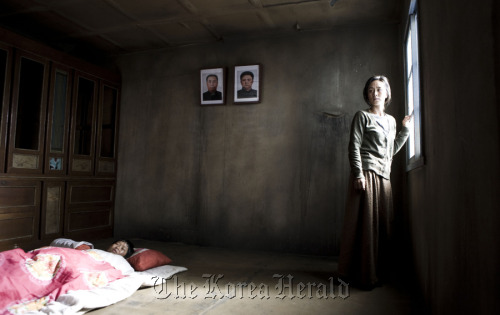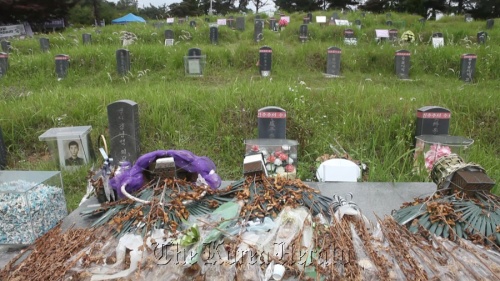NKFF, IDFF bring socially conscious films to Seoul
Two human rights-themed film festivals open in Seoul this month ― a rare opportunity to experience a wide range of socially conscious documentaries and feature-length films.
The first North Korean Human Rights Film Festival, which kicks off on Nov. 10 at Lee Hae-rang Arts Theater of Dongguk University in Seoul, brings together 10 non-fiction and feature films that delve into human rights conditions in the communist country.
The two-day event’s line up includes North Korean defector-turned-director Kim Gyoo-min’s feature debut “Winter Butterfly,” which was released in June.
Two human rights-themed film festivals open in Seoul this month ― a rare opportunity to experience a wide range of socially conscious documentaries and feature-length films.
The first North Korean Human Rights Film Festival, which kicks off on Nov. 10 at Lee Hae-rang Arts Theater of Dongguk University in Seoul, brings together 10 non-fiction and feature films that delve into human rights conditions in the communist country.
The two-day event’s line up includes North Korean defector-turned-director Kim Gyoo-min’s feature debut “Winter Butterfly,” which was released in June.

Based on a true incident that Kim encountered in North Hwanghae Province in the late 1990s, the movie tells the poignant tale of a mother and son who suffer from a severe food shortage. Kim has been living in South Korea since 2001.
Actress Park So-yeon, who played the mother in Kim’s film, is the promotional ambassador for the upcoming event.
American director N.C. Heikin’s documentary “Kimjongilia,” which features 12 North Korean defectors, has also been invited to show at the festival.
Meanwhile, Korean-Chinese director Zhang Lu’s feature film “Dooman River” presents a story of an ethnic Korean boy who lives in a Chinese province that shares its border with Hamgyeong Province in North Korea. His life is turned upside down when he befriends a North Korean boy who often crosses the border ― through the Duman River ― in secret, to find food in the Chinese town.
Japanese director Jiro Ishimura’s “North Korea VJ” offers a rare glimpse into the lives of video journalists who very often risk danger to report on the world’ s most isolated country.
According to Lee Jang-ho, the director of the festival, the upcoming event’s main focus is to raise awareness about human rights conditions in North Korea.
“Since this is our first edition, it may feel more like a campaign than a film festival,” he said. “We especially hope the younger generation can learn more about human rights issues.”
Opening on Friday at Seodaemun Cultural Center is Independence, Democracy Film Festival. Co-hosted by the International Women’s Film Festival in Seoul’s committee members and Seodaemun-gu office, the festival features four non-fiction and fiction films that explore the themes of human rights and social justice.
The film bash is a one-time event, and is being held as an extension of the Seodaemun-gu Independence, Democracy Festival which was held Oct. 28-29.
“Seodaemun-gu is a historically rich area, housing many historic culture sites such as Seodaemun Prison Hall― where many independence activists were imprisoned during the Japanese colonial period,” Kim Young-mi, one of the organizers of the event, told The Korea Herald.
“So we wanted to bring out the films that can really carry the spirit of human rights and democracy. And we chose films that can bring changes to our everyday lives, rather than something dramatic and big.”

The festival’s opener is “No Name Stars,” this year’s highly successful independent documentary by director Kim Tae-il. The film consists of interviews with ordinary people who had experienced the Gwangju Uprising in 1980, and turns their personal memories into a historical legacy.
After the screening of the documentary on Friday, Gwangju-based civil activist Yoon Cheong-ja will join the viewers and talk about the film and other human rights issues. Korean rice balls, called “jumeokbap,” will also be served, as people who participated in demonstrations during the Gwangju uprising often ate them together while protesting.
Director Kyung-soon’s 2008 documentary “Shocking Family,” on the other hand, will share her life as a single mother as well as other forms of unconventional families in Korea.
The festival also presents Swiss director Bettina Oberli’s 2006 comedy “Late Bloomers,” a hilarious tale of a group of four elderly women who would like to open a lingerie shop in a small, conservative town, even though almost everyone in town is opposed to the idea.
All screenings at IDFF are free.
For more information on NKFF, call (02) 723-3320. For IDFF, call (02) 330-1003.
By Claire Lee (dyc@heraldcorp.com)
-
Articles by Korea Herald












![[Today’s K-pop] BTS pop-up event to come to Seoul](http://res.heraldm.com/phpwas/restmb_idxmake.php?idx=644&simg=/content/image/2024/04/17/20240417050734_0.jpg&u=)





![[KH Explains] Hyundai's full hybrid edge to pay off amid slow transition to pure EVs](http://res.heraldm.com/phpwas/restmb_idxmake.php?idx=652&simg=/content/image/2024/04/18/20240418050645_0.jpg&u=20240418181020)

![[Today’s K-pop] Zico drops snippet of collaboration with Jennie](http://res.heraldm.com/phpwas/restmb_idxmake.php?idx=642&simg=/content/image/2024/04/18/20240418050702_0.jpg&u=)